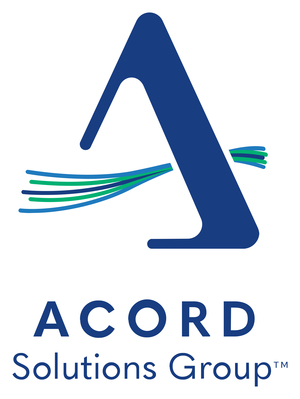Survey participants from across insurance industry reveal predictions, forecasts, and priorities for coming decades
PEARL RIVER, N.Y. and CHARLESTON, S.C., Feb. 23, 2023 /PRNewswire/ -- ACORD, the global standards-setting body for the insurance industry, today unveiled the results of an industry-wide survey on the future of insurance. ACORD CEO Bill Pieroni presented the findings of Insurance 2040: Prospects and Predicaments for Innovation & Value Creation at the DXC Connect Insurance Executive Forum in Charleston, SC, highlighting key insights and priorities for insurers as they look to the future.
ACORD surveyed insurance professionals for their perspective on the outlook for the industry over the next twenty years. Survey participants identified the technologies, capabilities, practices, and strategies projected to have the greatest impact in the global industry in both the near and long term. Respondents represented an industry-wide view, across lines of business, organization types, and geographies.
Sources of Competitive Advantage
Nearly 50% of survey participants anticipate that their greatest long-term source of competitive advantage will be the way in which they leverage technological capabilities. They expressed that operational efficiency and excelling in core insurance functions (underwriting and claims) may not be the key to driving superior performance – rather, technology-enabled optimization of these functions will become a baseline, necessary but not sufficient for differentiated advantage over the long term.
"Technological capabilities will be of critical importance to delivering a superior underwriting and claims experience, creating operational efficiencies, enhancing customer experiences, and leading in product development. While executing on core insurance functions will remain of paramount importance, this will rely more and more on thoughtfully leveraging the right technologies," Pieroni said. "Moreover, our analysis indicates that insurers will need to employ a composite strategy, executing across all areas in order to effectively compete in the future. Embracing technological capabilities and prioritizing digitalization will be essential in doing so."
Features of the Future Industry
Increased sophistication of technologies such as artificial intelligence, machine/deep learning, and Internet of Things (IoT) are projected to have great impact across the enterprise. Respondents indicated that, from the C-suite down, familiarity and proficiency with available technology tools will be an increasingly important capability. They not only anticipate a rise in the technology vs. people skew in their organizations' overall capability mix over the next 10-20 years, but 52% also named technology as the most critical capability/competency for the C-suite by 2040.
The channels by which customers purchase insurance will mirror this development. Industry stakeholders anticipate that direct channels will rise in significance across lines of business, while the expertise of brokers and agents will similarly continue to play an important role for customers.
"The need for human talent and expertise in our industry cannot be overstated," Pieroni continued. "However, we will see the focus shift toward familiarity and proficiency with emerging tech capabilities. Industry professionals with this skill set will continue to drive innovation and advancement across the ecosystem."
Survey participants also noted the changes they foresee to the insurance landscape, particularly concerning the role of nontraditional competitors. Though it may take a significant amount of time, nearly 25% of the industry professionals surveyed believe these competitors will capture material share of premium and profit by 2040.
Industry Priorities for 2040
Industry stakeholders also ranked their top technology priorities over the next two decades. APIs are widely recognized as the most important necessity for the near-to-medium term, with 24% naming it among their top three areas of focus. However, survey respondents seem to have confidence in addressing the need for API development over the next decade, anticipating their priorities to shift in the longer term. Respondents indicated that artificial intelligence and machine learning capabilities will be even higher priorities in 20 years than in 10 years, with quantum computing doubling in importance over the same time interval.
"These results are right on the mark," Pieroni said. "Standardized data exchange via APIs is a critical enabler of transformation, while AI and quantum computing have the potential to prove truly transformative, across the enterprise, in the long run. These capabilities will have a material impact across stakeholders and the insurance value chain. Real-time data leverage and risk assessment will have dramatic impact on stakeholders' ability to create value for shareholders and customers alike."
A summary of the results of the Insurance 2040 survey, as well as more information on ACORD's industry studies, is available at www.acord.org/research.
ACORD (Association for Cooperative Operations Research and Development) is the global standards-setting body for the insurance and related financial services industries. ACORD facilitates fast, accurate data exchange and efficient workflows through the development of electronic standards, standardized forms, and tools to support their use. ACORD engages thousands of insurance and reinsurance companies, agents and brokers, software providers, financial services organizations and industry associations in more than 100 countries. ACORD maintains offices in New York and London. Learn more at www.acord.org.
CONTACT: Beth Jarecki
[email protected]
SOURCE ACORD

WANT YOUR COMPANY'S NEWS FEATURED ON PRNEWSWIRE.COM?
Newsrooms &
Influencers
Digital Media
Outlets
Journalists
Opted In





Share this article